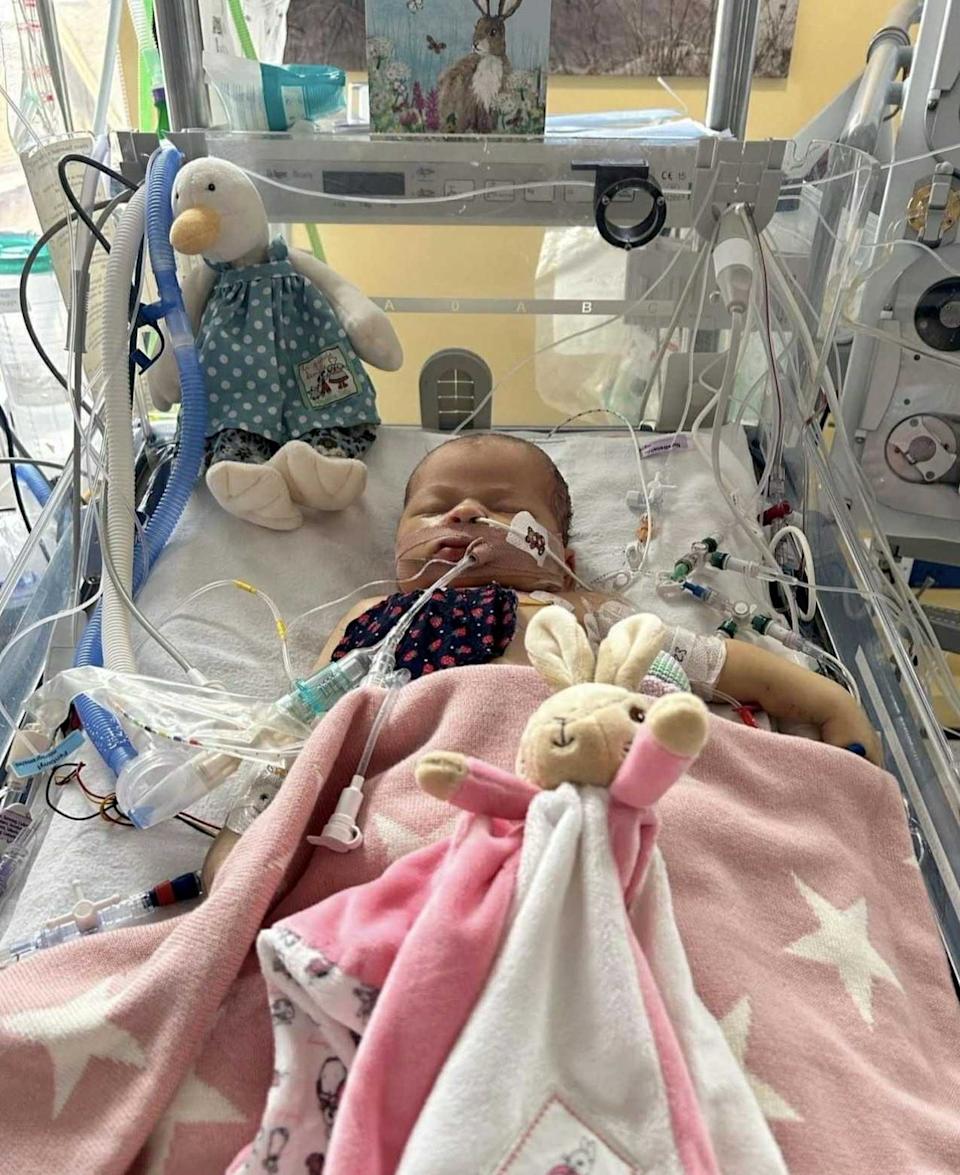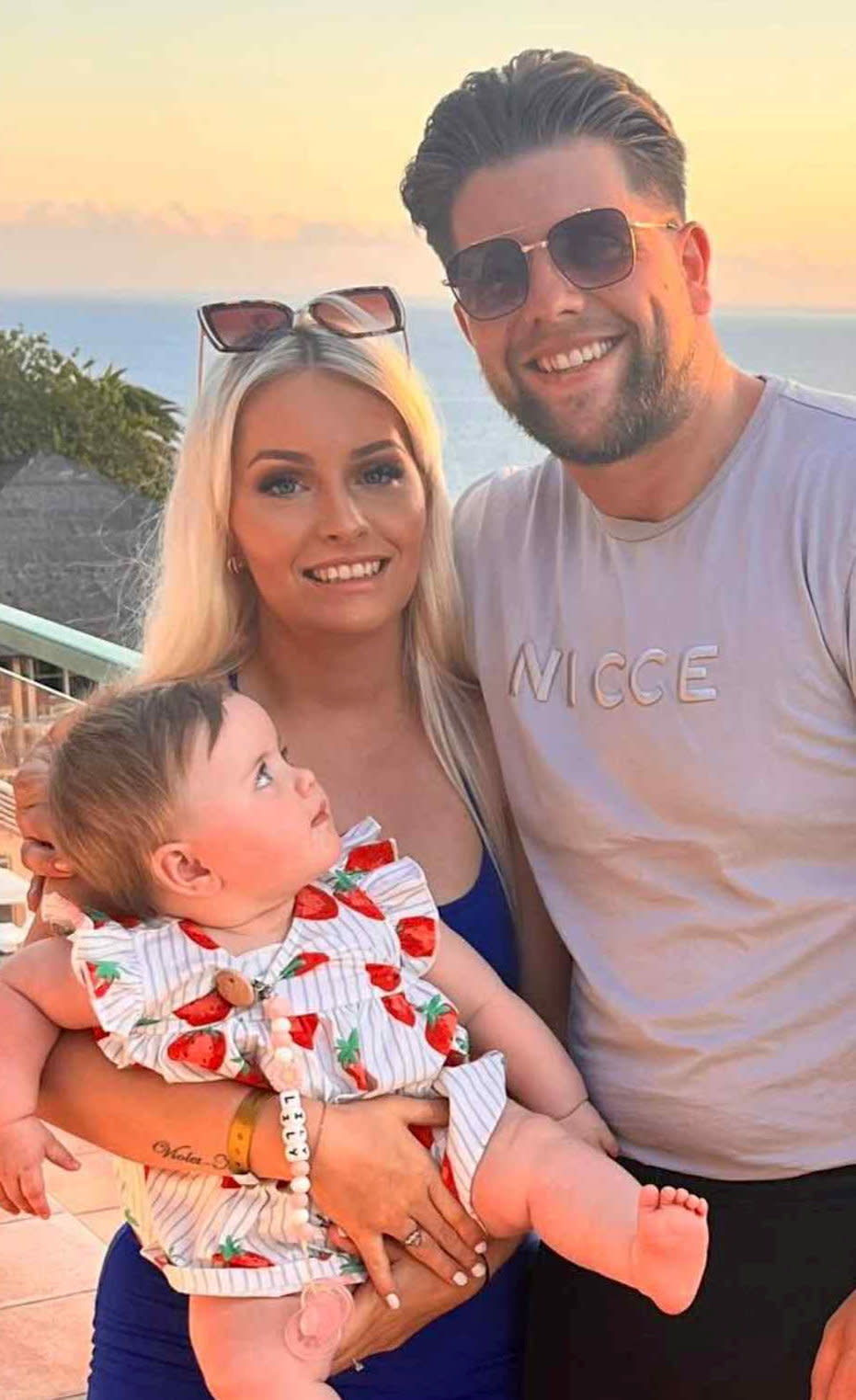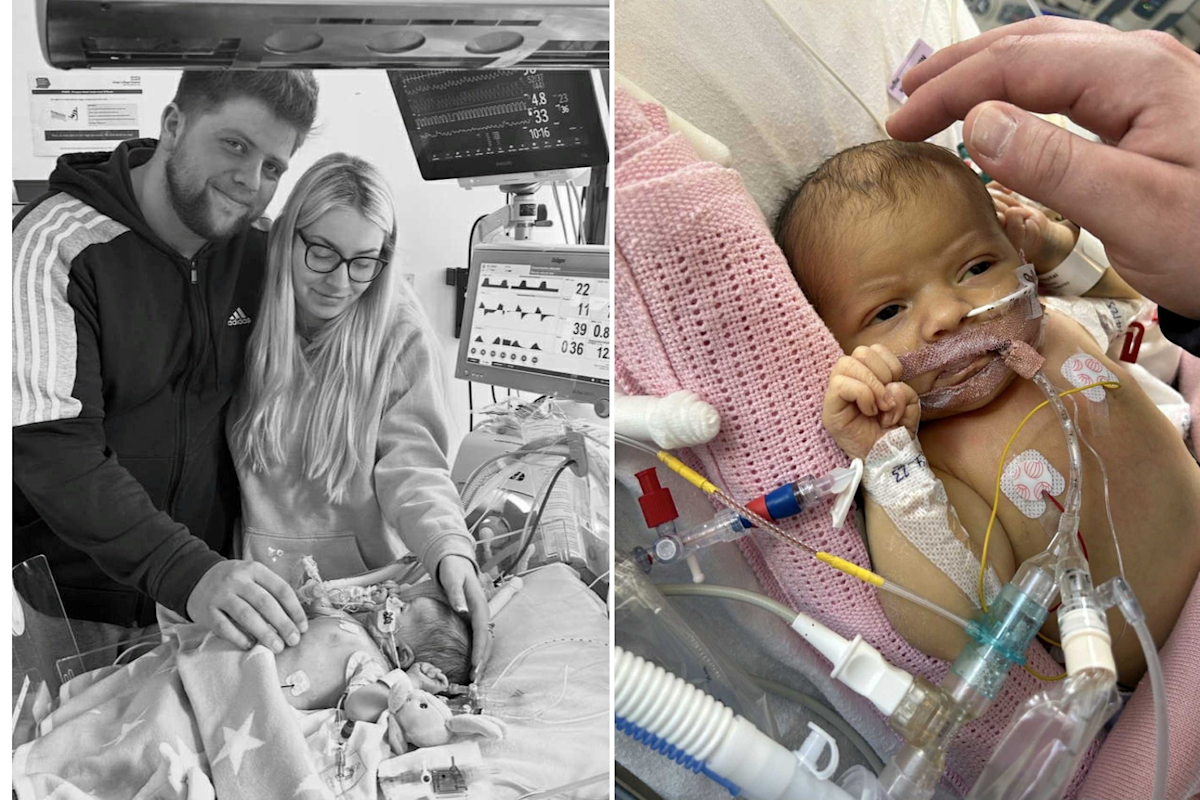A mum is urging people not to kiss newborn babies, after she tragically lost her daughter to a virus some people don’t even realise they’re carrying.
Hailey Riches, 25, from Billingshurst, Sussex, had a healthy pregnancy and gave birth to her daughter Violet-May Constantinou via emergency C-section on 22 March 2023.
Everything seemed fine at first, but she noticed something wasn’t right within days of returning home.
Violet had started feeding less, seemed tired, and developed a yellow tone to her skin.
A health visitor advised the family to check for jaundice, and Hailey took her to Worthing Hospital. But the levels didn’t appear concerning, and Violet was sent home.
“I remember feeling like something was off,” Hailey says. “But I also didn’t want to overreact. We were told things looked OK.”
Over the next few days, Violet’s condition worsened. She continued to struggle with feeding and developed a temperature. At just eight days old, Hailey took her back to hospital – and this time, doctors admitted her.

Neonatal herpes is often spread through kissing and Hailey Riches wants to make sure other parents know the danger. (Hayley Riches/SWNS)
Blood tests and a lumbar puncture showed Violet had neonatal herpes (HSV-1), a dangerous viral infection in newborns caused by the herpes simplex virus, which causes cold sores and genital ulcers in adults.
Violet was given antiviral medication straight away, but her condition deteriorated rapidly. She began having seizures and was moved to Southampton Hospital for intensive care.
“The doctors told us they’d be surprised if she survived the next 24 to 48 hours,” Hailey continues. “It was terrifying.”
Violet was soon flown to King’s College Hospital in London after doctors realised she was experiencing acute liver failure. She was placed at the highest priority for a liver transplant in the UK but she died in hospital on 21 April, at exactly one month old, still waiting for a transplant.
“It was absolutely traumatising,” Hailey says.
“Every day, there was something new. Her lungs were affected, her brain, and she went into cardiac arrest – we watched her be resuscitated for nine minutes. It just kept getting worse until we had to say goodbye.”
Be persistent. I’d rather overreact and be told everything’s fine than not say something and regret it.
No visible symptoms
Doctors told Hailey and her fiancé, Dimitri Constantinou, 30, that they would likely never know exactly how Violet contracted the virus. Neither parent had visible symptoms or a history of cold sores or genital herpes.
“I don’t have genital herpes. None of us had cold sores,” Hailey says. “They told us it probably came from someone outside, but we’ll never know who. Anyone can carry and pass the virus, even if they have no symptoms.”
HSV-1 is a common virus mostly spread through oral contact; things like kissing, sharing cutlery, or close face-to-face interaction. While harmless to most adults, in young babies with no immune protection, it can be fatal.
“I see people online saying, ‘Why can’t I kiss a baby that’s not mine?’” Hailey says.
“And it really frustrates me. You don’t know what someone’s been through. This isn’t to scare people – it’s to protect babies who can’t protect themselves.”
After losing Violet, Hailey was understandably anxious when she became pregnant again. In August 2024, she and Dimitri welcomed their second daughter, Lily. But the early weeks were filled with fear.
“We were told the first six weeks are the most critical. I didn’t let anyone kiss her, and I made sure people washed their hands before holding her. I was much more protective than I ever expected to be, and that’s OK.”

The couple welcomed a second daughter, Lily, but want to make sure what happened to Violet-May doesn’t happen to others. (Hayley Riches /SWNS)
Raising awareness
Hailey, who works as a speciality coordinator for the NHS, is now sharing her family’s story to raise awareness. She wants to empower other parents to speak up and trust their instincts.
“If your baby doesn’t seem right – feed changes, tiredness, temperature – please get them checked,” she says. “Be persistent. I’d rather overreact and be told everything’s fine than not say something and regret it.”
I see people online saying, ‘Why can’t I kiss a baby that’s not mine?’ And it really frustrates me. This isn’t to scare people – it’s to protect babies who can’t protect themselves.
She also hopes people understand just how serious neonatal herpes can be and are more cautious around babies.
“You might not have any symptoms at all, but that doesn’t mean you’re not carrying the virus,” Hailey says. “Don’t take the risk. A kiss might seem harmless, but it could cost a life.”
Hailey thanked the Southampton Hospital, King’s College staff and the Ronald McDonald House charity, who supported them throughout Violet’s treatment.
“We’re so grateful for the care and compassion we were shown,” she says. “We’ll never forget it, just like we’ll never forget Violet.”
What is neonatal herpes?
Neonatal herpes is a rare but serious infection in newborn babies caused by the herpes simplex virus (HSV). It can be passed to a baby in pregnancy and labour if the mum has had genital herpes within the last six weeks of pregnancy.
After birth, it can be passed on when a baby is kissed by someone with the virus.
There are two types of HSV:
-
HSV-1, which usually causes cold sores around the mouth
-
HSV-2, which is more often linked to genital herpes
Most cases in newborns are caused by HSV-1 and can be spread through close contact such as kissing or touching, especially if someone has a cold sore, even one that hasn’t appeared yet.
Because newborns have very weak immune systems, the virus can spread quickly in their bodies and become life-threatening. In some cases, it can affect the brain, lungs or liver.
Early symptoms may include tiredness, poor feeding, a fever, or unusual skin colour such as jaundice. It is treated with antiviral medication, but early detection is crucial.
The NHS advises people to avoid kissing babies, especially newborns, if they have a cold sore or feel unwell, even if they don’t yet show symptoms.
Additional reporting by SWNS
Read more about health:
